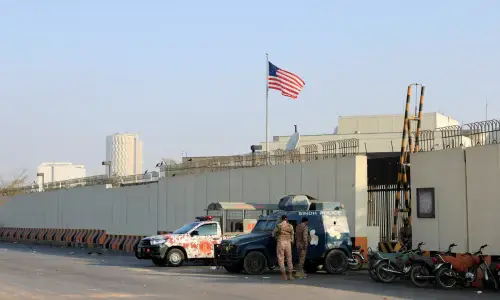ISLAMABAD: Adviser to the Prime Minister on Finance Miftah Ismail has brushed off concerns that economic growth will suffer because of the country’s re-inclusion on a terrorist financing watchlist, and lashed out at the United States for seeking to “embarrass” his country.
Washington last week persuaded member states of the Financial Action Task Force (FATF) to place Pakistan back on the “grey list” of nations with inadequate terrorist financing or money laundering controls. Pakistan was on the list for three years, until 2015.
The diplomatic setback has sparked anger in Islamabad against the US, which championed the motion against Pakistan at the FATF meeting in Paris. It represented another blow to the worsening relationship between the uneasy allies, who have long differed on how to combat militants waging war in Afghanistan.
It has also heightened concerns that Pakistan is becoming internationally isolated, and that its economy could suffer if global banking intuitions cut links with the nuclear-armed nation, or otherwise increase the cost of doing business with Pakistan.
Editorial: Alone at FATF
Mr Ismail, who led Pakistan’s negotiations in Paris, told Reuters that Washington did not seem genuinely eager to see Pakistan boost its terrorist financing regulations and was instead bent on humiliating the country.
“If the Americans were interested in working with us and improving our CTF (counter-terrorist financing) regulations, they would have taken the offer I was making them,” he said. “But their idea was just to embarrass Pakistan.”
Mr Ismail said that he had urged the US to allow Pakistan until June to fix any outstanding CTF issues and ceded ground in negotiations to strike a deal, but that the US was determined to see Pakistan suffer.
The adviser said Pakistan’s law-enforcement shortcomings were often confused for lack of desire, especially at provincial level, where police officers are poorly trained when it comes to terrorist financing legislation.
“The will is there,” he added.
Mr Ismail ruled out Pakistan’s retaliation against Washington over the FATF listing. He said the country would keep working to improve its CTF capabilities and win the confidence of Britain, Germany and France, who co-sponsored the US motion in Paris.
Pakistan hoped to be removed from the grey list in six to 12 months from June, when it would be officially placed on the watchlist, Mr Ismail added.
The adviser said he did not foresee the FATF decision acting as a brake on Pakistan’s economy, which, with growth above five per cent, is expanding at its fastest pace in a decade.
Published in Dawn, February 27th, 2018































